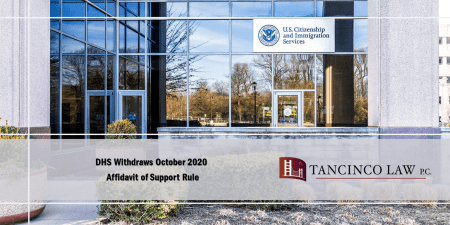The U.S. Citizenship and Immigration Services (USCIS) announced on March 19, 2021 that proposed rule on affidavit of support dated October 2, 2020 will be withdrawn. This policy change is consistent with the Department of Homeland Security’s (DHS) commitment to reduce barriers within the legal immigration system. DHS and USCIS are committed to eliminating barriers that prevent legal immigrants from accessing government services available to them.
The 189-page October 2020 rule would have imposed higher qualifying and evidentiary requirements including production of bank information and credit reports. These requirements would have placed undue burden on the U.S. citizens petitioning their relatives who are signing affidavits of support. According to the USCIS, it is estimated that the cost of implementing these requirements on U.S. citizen petitioners is $2.4 billion over the next decade.
The withdrawal of this rule is just one of many policies that reverses the prior administration’s restrictive immigration rules. These changes are all consistent with President Biden’s Executive Order (EO) 14012, Restoring Faith in Our Legal Immigration Systems and Strengthening Integration and Inclusion Efforts for New Americans.
Both the Department of Homeland Security and the Department of State are reverting to the public charge standard that had been in effect prior to the proposed changes.
Meantime, the DHS has reinstated the Form I-864W, Request for Exemption for Intending Immigrant’s Affidavit of Support, which allows certain applicants to seek exemption from the affidavit of support requirements. These applicants include: (1) individuals who have earned or can receive credit for 40 quarters of coverage under the Social Security Act (SSA); (2) children who will become U.S. citizens upon entry to the United States; (3) self petitioning widow/ers and (4) self-petitioning battered spouses and children. These applicants will be required to submit Form I-864W if seeking an exemption from the affidavit of support requirement.


